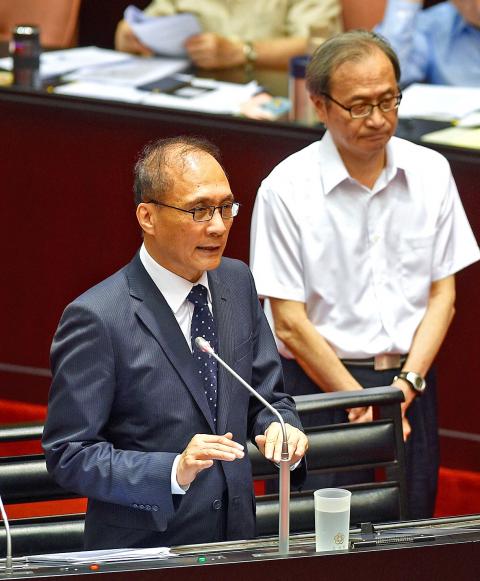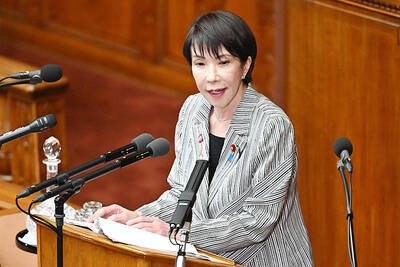Premier Lin Chuan (林全) yesterday gave more details about the preconditions for the possible reactivation of the No. 1 reactor at the Jinshan Nuclear Power Plant in New Taipei City’s Shihmen District (石門), and apologized for the flooding of Taiwan Taoyuan International Airport and controversial remarks about Taiwanese “comfort women” he made last week.
Lin made the remarks during a question-and-answer session at the legislature.
Chinese Nationalist Party (KMT) Legislator Alicia Wang (王育敏) asked Lin how much electricity the government has helped save, reminding him that in March last year the leaders of 13 cities and counties, led by by-then presidential candidate Tsai Ing-wen (蔡英文), vowed to launch an initiative to cut energy consumption.

Photo: Lo Pei-der, Taipei Times
Lin said the administration plans to cut energy consumption equivalent to the electricity generating capacity of the Fourth Nuclear Power Plant in New Taipei City’s Gongliao District (貢寮), but it has been in office less than one month.
“The city and county heads have been in office for quite a while, and places such as Tainan and Kaohsiung, and Pingtung, Yunlin and Changhua counties are all using more electricity than ever,” Wang said.
“President Tsai in August last year guaranteed that there would be no power shortages during the Democratic Progressive Party’s [DPP] time in office, and Minister of Economic Affairs Lee Chih-kung (李世光), before he was sworn in, said that there would be no electricity shortage for the next two years. However, 10 days after Lee took office, he said: ‘There is no 100 percent guarantee of an uninterrupted power supply,’” Wang said.
Wang said Lin’s statement that he is considering the reactivation of the No. 1 reactor at the Jinshan Nuclear Power Plant had upset environmental advocacy groups and contradicted a DPP anti-nuclear power pledge.
“The goal of a 2025 nuclear-free homeland is unchanged, and the plan to retire the Jinshan plant and the Guosheng Nuclear Power Plant in New Taipei City’s Wanli District (萬里) as scheduled is also unchanged,” Lin said.
Lin said the government would exhaust every possible avenue in its bid to save energy, to develop renewable energy sources and to enhance the management of electricity usage and distribution.
“Only when three preconditions — all ways [to save energy] have been exhausted, safety is guaranteed and a social consensus reached — would the reactivation of the Jinshan and Guosheng nuclear power plants be considered,” Lin said.
Wang also pushed Lin about the flooding of the Taoyuan airport, which “might have made tourists think that they had arrived in a third-world nation,” and claimed that the Cabinet’s “crisis management” skills were not up to par with the administration of former premier Simon Chang (張善政), which she said responded to February’s Meinong (美濃) earthquake quickly and effectively.
Wang demanded Lin apologize to the public for the airport flooding, as “the Ministry of Transportation and Communications and the Executive Yuan should also be held accountable instead of just sacking airport officials,” she said.
Lin consented and apologized.
Lin was also asked to apologize for alleging that “comfort women,” were “either forced or had volunteered” to work as prostitutes for the Imperial Japanese Army.
He made the remarks on Friday last week when responding to a question by KMT Legislator Alex Fai (費鴻泰) concerning “whether comfort women were forced or joined voluntarily.”
Lin said “both were possible, with people having different views on the issue.”
In response Fai said: “You are a shame to the Chinese nation; they are our Chinese women.”
The Executive Yuan quickly issued two press releases after Friday’s question-and-answer session.
The first was to “supplement” what the premier had said in the legislature, saying that Lin admitted to having little understanding of the matter and is willing to get to know more about the facts, adding that even so-called “voluntary enrollment” was out of economic and gender oppression.
Lin said that the government would “proactively and assertively negotiate with the Japanese government” to help older people who had suffered greatly obtain the justice they deserve.
The second statement, released an hour after the first, said the premier wished to apologize for his “incomplete and indiscreet” remarks that “might have hurt some and caused trouble to society.”

The Central Weather Administration (CWA) yesterday said it expected to issue a sea warning for Typhoon Fung-Wong tomorrow, which it said would possibly make landfall near central Taiwan. As of 2am yesterday, Fung-Wong was about 1,760km southeast of Oluanpi (鵝鑾鼻), Taiwan’s southernmost point, moving west-northwest at 26kph. It is forecast to reach Luzon in the northern Philippines by tomorrow, the CWA said. After entering the South China Sea, Typhoon Fung-Wong is likely to turn northward toward Taiwan, CWA forecaster Chang Chun-yao (張峻堯) said, adding that it would likely make landfall near central Taiwan. The CWA expects to issue a land

Taiwan’s exports soared to an all-time high of US$61.8 billion last month, surging 49.7 percent from a year earlier, as the global frenzy for artificial intelligence (AI) applications and new consumer electronics powered shipments of high-tech goods, the Ministry of Finance said yesterday. It was the first time exports had exceeded the US$60 billion mark, fueled by the global boom in AI development that has significantly boosted Taiwanese companies across the international supply chain, Department of Statistics Director-General Beatrice Tsai (蔡美娜) told a media briefing. “There is a consensus among major AI players that the upcycle is still in its early stage,”

The Central Weather Administration (CWA) yesterday said it is expected to issue a sea warning for Typhoon Fung-wong this afternoon and a land warning tomorrow. As of 1pm, the storm was about 1,070km southeast of Oluanpi (鵝鑾鼻), Taiwan’s southernmost point, and was moving west-northwest at 28 to 32kph, according to CWA data. The storm had a radius of 250km, with maximum sustained winds of 173kph and gusts reaching 209kph, the CWA added. The storm is forecast to pass near Luzon in the Philippines before entering the South China Sea and potentially turning northward toward Taiwan, the CWA said. CWA forecaster Chang Chun-yao (張峻堯) said

Japanese Prime Minister Sanae Takaichi yesterday said that China using armed force against Taiwan could constitute a "survival-threatening situation" for Japan, allowing the country to mobilize the Japanese armed forces under its security laws. Takaichi made the remarks during a parliamentary session while responding to a question about whether a "Taiwan contingency" involving a Chinese naval blockade would qualify as a "survival-threatening situation" for Japan, according to a report by Japan’s Asahi Shimbun. "If warships are used and other armed actions are involved, I believe this could constitute a survival-threatening situation," Takaichi was quoted as saying in the report. Under Japan’s security legislation,